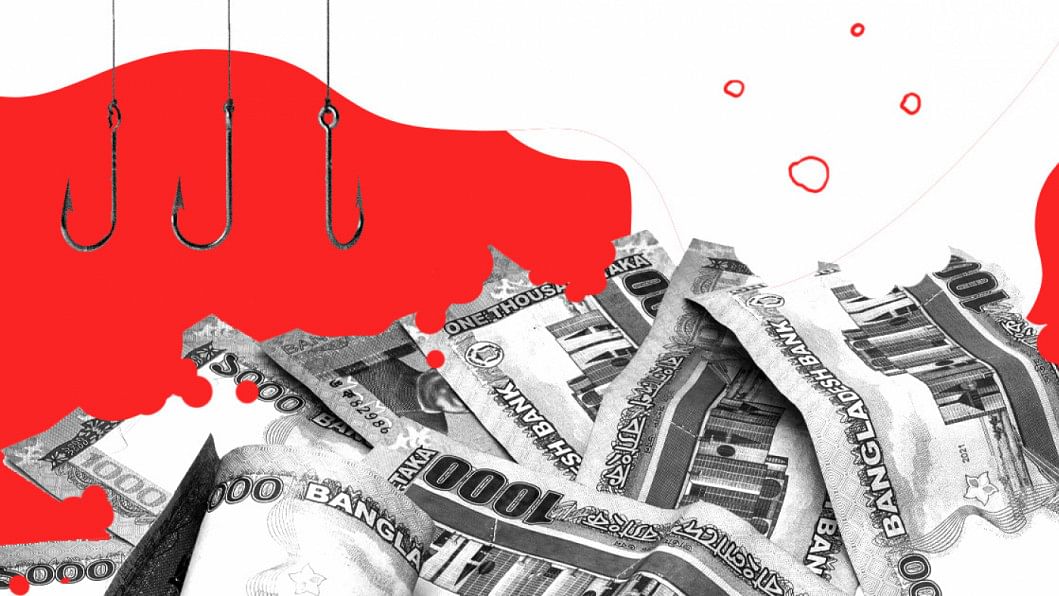
Embezzling thousands of crores of taka in the name of taking loans from banks is a regular occurrence in Bangladesh. Sometimes behind the front of business and industrial loans, sometimes through direct fraud and deception, such embezzlement takes place. The frequent reporting on such scams, involving a new bank each time, is reminiscent of a popular web series portraying heists. The latest Tk 16,000 crore LC fraud from Social Islami Bank and the Tk 30,000 crore loan scam from Islami Bank by S Alam Group are the latest additions to this parade. These incidents are so systematically organised, using different institutional patronages, that they cannot be called exceptional events and must be seen as an established mechanism of capital accumulation by looting the public’s money.
Looting in the name of bank loans
In Bangladesh, the easiest and most common method of primary capital accumulation for businesses is to get loans from public and private banks without collateral – or with inadequate collateral – using political patronage and by bribing bank managers. Then, they default. Debt restructuring, lawsuits, investigations, and writs continue for years.
Yunus Badal, who was caught by the police for stealing a car in 2007, emerged as one of Janata Bank’s biggest borrowers in 2010 due to his political patronage. Janata Bank violated loan approval rules and provided him with loans worth Tk 5,000 crore in just six years. The chief perpetrator of the Sonali Bank-Hallmark scam, Tanvir Mahmood, embezzled Tk 2,731 crore. Both became businessmen of great scale, with Badal going on to own 22 enterprises.
Bank heists by bank owners
Unlike other private or public limited companies, a paid-up capital of Tk 400 crore is required to establish a bank. After that, thousands of ordinary people deposit their savings in said bank. By investing only Tk 400 crore, the bank owners are able to control the deposits of thousands of crores of taka, decide where to invest it, and who to lend it to. So, to accumulate a huge amount of money by investing very little, one first acquires a bank licence using political connections and then embezzles the deposited money under the guise of loans.
According to Bangladesh Bank (BB) policies, no bank director can borrow more than 50 percent of their total shares from their bank. To bypass this regulatory hurdle, bank owners either get loans from their banks through relatives or front companies, or take out loans from other public or private banks by establishing a “mutual understanding” with other directors/owners.
The looting of the Farmers Bank deposits by the owners themselves is a case in point. Due to corruption by the owners, the bank which came into operation in 2013 quickly fell into a capital deficit of Tk 283 crores. By December 2017, its amount of defaulted loans increased to Tk 723 crore. In a report, the BB had held Farmers Bank’s former chairman Muhiuddin Khan Alamgir and ex-chairman of its executive committee Mahabubul Haque Chisty largely responsible for the scams.
The case of Islami Bank, the largest private sector bank in Bangladesh, is another example of how people’s deposits are looted by bank owners themselves.
In January 2017, the bank fell into a severe financial crisis, just 15 months after its ownership came into the hands of S Alam Group. According to BB’s audit report, S Alam Group has taken out more than Tk 30,000 crore in loans from Islami Bank using various unethical mechanisms.
Unbridled loan restructuring facilities
Default loans are becoming more and more prevalent because vested groups are using their political backing and colluding with bank directors and owners to obtain the loans. Far from recovering thousands of crores of the people’s money and punishing the defaulters, the banks are instead giving them rescheduling benefits, with relatively low interest rates and long-term restructuring facilities.
According to a report published by The Daily Star, in 2015, 11 big business groups – each of them having taken out loans of over Tk 500 crore from different banks – led by Beximco made a proposal to Bangladesh Bank for restructuring their bad loans. The BB agreed and the companies were given a rescheduling benefit of only one to two percent down payment, instead of the usual 10 percent. The total amount of the restructured loan was Tk 15,000 crore. Despite these concessions, after two years, six of these companies – Beximco, SA Group, Ratanpur Group, RSRM, Keya, and MR Group – failed to repay instalments. Interestingly, Beximco – which had obtained one-third of the restructured loan – made profits and paid dividends, yet did not pay back loans.
In May 2019, BB issued a directive providing loan defaulters the opportunity to reschedule their classified loans by making a down payment of only two percent, instead of the previous 10-50 percent. The interest rate was capped at nine percent from 12-16 percent and the tenure for repayment was made 10 years.
In July 2022, the central bank allowed businesses to reschedule their loans by making a down payment of 2.5 to 6.5 percent on their term loan, instead of the previous 10 to 30 percent. It also extended their payment tenure to five to eight years, from the previous maximum of two years. In the meantime, businesses could also avail new loans.
In this way, through rescheduling, defaulted loans are shown to be reduced without even collecting them.
Two other methods used to mask the reality of default loans are the relaxation of loan write-offs and classification policies. In February 2019, BB reduced the time period after which banks can write-off bad debts from five years to three years, and increased the amount which banks can write off without filing a lawsuit with the Artha Rin Adalat from Tk 50,000 to Tk 2 lakh. This has been further increased to Tk 5 lakh, according to the latest directive issued on January 5, 2023. And in April 2019, the time period after which an overdue loan can be classified as “substandard,” “doubtful,” or “bad/loss” was increased to three months.
Culture of impunity
Habitual bank loan defaulters who are politically connected are not punished for embezzling public money. Only the small fish are caught and put in jail. The probes and trials go on for years without any conclusion. This culture of impunity encourages defaulters to continue to steal money from banks.
Although an investigation was carried out in the case of the central bank reserve theft, the investigation report was not published and the guilty persons were not prosecuted. The parliamentary committee related to the finance ministry has not published the investigation report on the Sonali Bank-Hallmark scam, either. The trial of 38 cases filed by the Anti-Corruption Commission (ACC) against Hallmark is still continuing at snail’s pace.
Authorities were reportedly fully aware of the irregularities and corruption of the former chairman of BASIC Bank, Sheikh Abdul Hye Bachchu. But no action was taken against him. The ACC filed 56 cases in this regard, but Bachchu, accused of being the mastermind, was not charged in any of them. Expressing dissatisfaction with the ACC’s role in this case, the High Court recently said, “Crores of taka have been embezzled. But no work is being done though the Anti-Corruption Commission and so many judges and lawyers are there. Why are they [ACC] silent? This is just like a drama. We are watching the drama. This is not acceptable.”
Recognise the pattern
It is evident that, while disbursing loans, state-owned banks prioritise those who are close to the state power. On the other hand, private banks act for the primitive accumulation of capital, prioritising businesses related to bank owners and directors. Sometimes, powerful loan defaulters obtain stay orders from the HC using legal loopholes to not be included in the defaulters’ list and thus continue to take out new loans from other banks.
If we closely observe and analyse the context of each of the ongoing banking scams, a structural pattern becomes evident, one that is directly related to the country’s capital formation, the structure of the financial and banking sectors, and the interests of the booty capitalist. And there is no chance of ending this “mega serial” of scams without strong and organised resistance from the people.
Kallol Mustafa is an engineer and writer who focuses on power, energy, environment and development economics.










